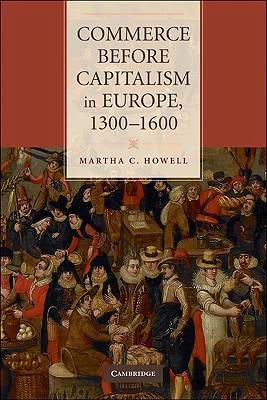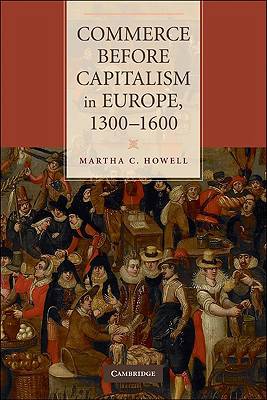
Bedankt voor het vertrouwen het afgelopen jaar! Om jou te bedanken bieden we GRATIS verzending (in België) aan op alles gedurende de hele maand januari.
- Afhalen na 1 uur in een winkel met voorraad
- In januari gratis thuislevering in België
- Ruim aanbod met 7 miljoen producten
Bedankt voor het vertrouwen het afgelopen jaar! Om jou te bedanken bieden we GRATIS verzending (in België) aan op alles gedurende de hele maand januari.
- Afhalen na 1 uur in een winkel met voorraad
- In januari gratis thuislevering in België
- Ruim aanbod met 7 miljoen producten
Zoeken
€ 53,45
+ 106 punten
Uitvoering
Omschrijving
In Commerce before Capitalism in Europe, 1300-1600, Martha C. Howell challenges dominant interpretations of the relationship between the so-called commercial revolution of late medieval Europe and the capitalist age that followed. Howell argues that the merchants, shopkeepers, artisans, and consumers in cities and courts throughout Western Europe, even in the densely urbanized Low Countries that are the main focus of this study, were by no means proto-capitalist and did not consider their property a fungible asset. Even though they freely bought and sold property using sophisticated financial techniques, they preserved its capacity to secure social bonds by intensifying market regulations and by assigning new meaning to marriage, gift-giving, and consumption. Later generations have sometimes found such actions perplexing, often dismissing them as evidence that business people of the late medieval and early modern worlds did not fully understand market rules. Howell, by contrast, shows that such practices were governed by a logic specific to their age and that, however primitive they may appear to subsequent generations, these practices made Europe's economic future possible.
Specificaties
Betrokkenen
- Auteur(s):
- Uitgeverij:
Inhoud
- Aantal bladzijden:
- 378
- Taal:
- Engels
Eigenschappen
- Productcode (EAN):
- 9780521148504
- Verschijningsdatum:
- 12/04/2010
- Uitvoering:
- Paperback
- Formaat:
- Trade paperback (VS)
- Afmetingen:
- 152 mm x 226 mm
- Gewicht:
- 521 g

Alleen bij Standaard Boekhandel
+ 106 punten op je klantenkaart van Standaard Boekhandel
Beoordelingen
We publiceren alleen reviews die voldoen aan de voorwaarden voor reviews. Bekijk onze voorwaarden voor reviews.









